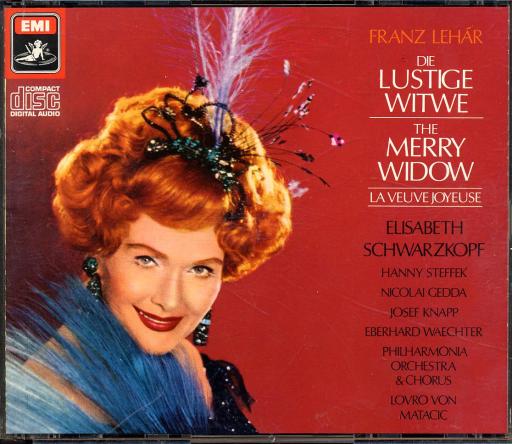Merry Widow (Die Lustige Witwe) |
|||||||||
|---|---|---|---|---|---|---|---|---|---|
| Primary Creator |
|
||||||||
| Contributor(s) |
|
||||||||
| Properties |
|
||||||||
| Name of Work | Merry Widow (Die Lustige Witwe) | ||||||||
| Production Date | 1905 | ||||||||
| Production Location |
|
||||||||
| Current Location |
|
||||||||
| Media Types | CD | ||||||||
| General Notes | It is the music rather than the plot or libretto that gives this operetta its power. This performance, performed by Elisabeth Schwartzkopf as Hanna and Eberhard Wachter as Danilo, conducted by Lovro von Matacic, avoids treating the familiar music in the plodding way that sounds like 'I've heard this before.' All its beauty, originality and complexity is expressed. It is sung in the original German, rather than any of the English translations. |
||||||||
Description
The ambassador of poverty-stricken Pontevedro is holding a ball in Paris, where he is hoping to have a wealthy widow -- Hanna -- marry another Pontevedrian, in order to prevent the country's bankruptcy. The man chosen is a secretary at the embassy - Danilo. But when Hanna and Danilo meet, they rekindle an old love. And because he loves her, Danilo refuses to marry her -- for money. After a series of misunderstandings they finally do agree to marry, for love. <br>
Theme
Love can be gay and tender, solemn and lighthearted, painful and joyous.
Emotional Sum or Sense-of-life
Love brings gaiety and joy to life.<br>
Context Information
Tags
Operetta, romance, waltz
